The Digital Dinosaur (that’s me) Goes on the Road
A MiddleWeb Blog
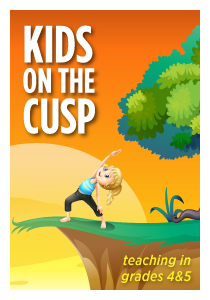
Ms. Hunter’s model made me cognitively aware of my objectives, helped me think through what constitutes an effective anticipatory set and develop the step-by-step procedures with which to meet these objectives.
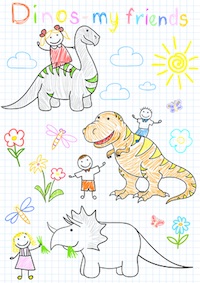
My fourth grade class is studying the regions of the United States. As part of our study of non-fiction, we looked at a text feature (commonly known as a timeline) that tracks technological advancements from 1775 through 1900. There were many that changed the face of communication, and therefore education. We started with Eli Whitney and the cotton gin, jumped ahead a few decades to the steamboat and locomotive, and within 70 years, we had the telephone, the automobile, and the airplane (not to mention the typewriter). All these advances were made over the course of 125 years. The kids recognized that we came a long way as a society in that time period.
Since that time, the pace of invention has increased exponentially. The computer, which used to take up the space of a small office, now fits in a cell phone. Teachers who used to share ideas and inspirations in the teachers lounge now have access to the insights and ideas of educators across the globe…but they have to be willing to merge into traffic and do their best to keep it flowing smoothly (and to be respectful of other drivers).
Taking flight
I’m unsure of my ultimate technological destination, but recently I clicked on my seatbelt anyway, and sat gazing out the window of an invention that had defied the laws of physics at one point in history. This airplane was taking me to North Carolina (the state of its conception, as it happens) for some professional development.
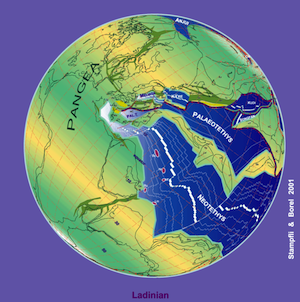
Triassic Earth (Wikipedia)
I would be spending the next two days investigating the world of online professional development. Along with a curl of discomfort about a topic I knew little of, there was also a spark of excitement as I prepared to leave the Triassic Period of my teaching career and follow a new flight plan.
I was given the opportunity to get what I thought would be a birds-eye view of online professional development course creation. My district is still a little fuzzy about whether they will accept online course work as an avenue to gain professional development hours. This trip was approved, so perhaps they are thawing out of their own Ice Age as new opportunities (like this one at the University of North Carolina Chapel Hill campus) arise.
Andy Mink, the Executive Director of LEARN NC in the university’s School of Education, was holding a workshop to explore an online learning system called Moodle (familiar to many, but not to me). Moodle allows educators to create online courses and customize existing courses for use in professional and personal development.
To say the least, I was intimidated by the thought of actually helping to create an online course. Truth be told, even taking an online course is a bit intimidating for this Brontosaurus…but either I moved forward, or I stayed back in the Stone Age. I decided to get on the plane and go.
Then the snow came. The east coast was hit with chilly weather and its accompanying precipitation. As far south as Florida, weather conditions were bad. Two flights before mine had already been cancelled. Maybe this was a sign to stay home with Madeline Hunter and try to learn about new technology another day.
Or maybe not. My plane took off on time, and I landed in the northern-most state of Carolina, a country without salt trucks and with a layer of ice on the roads. They had to cancel the workshop that was scheduled for the following day. But this didn’t stop Andy Mink and his colleague T.J. Wolfe, who works closely with Mink, to design online courses and make virtual PD meaningful and accessible.
Southern hospitality
My two-day stint in North Carolina ended up being quite enlightening and inspiring.
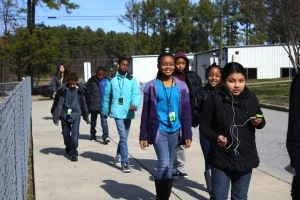
Andy and T.J. met us at their offices, weather notwithstanding, and gave us a “private workshop,” allowing us to sit at a large conference table with BLTs from a Bon Appetit approved local eatery (a converted gas station actually) in hand.
It wasn’t that scary or intimidating after all. There was a definitive logic to following the “bread crumbs” they taught us about. It was easy to navigate my way back to control central through bread crumbs logic. Bread crumbs make sense to me, and I need to keep technology as simple as I can. I’m still a newbie.
The world of Moodle offers an opportunity to expand the conversations that I have been so comfortable having in the staff lounge. Laura and I had many chats in that same lounge during our early years as teachers. Today, we were at UNC-CH to develop free online courses for the Walking Classroom and give support to teachers across the country who are either using the program or waiting to try it with their students.
These courses will be part of a diverse range of thought-provoking offerings made available through LEARN NC. I found an interesting mix while perusing the site. The Projects and Special Collections area includes varied topics, such as World Cultures, Environmental Science, and Technology Integration. My mind started to marinate in the possibility of exploring some of these online opportunities, in the spirit of trying something new and staying out of my comfort zone.
Educators want to learn and grow in our profession. Many of us who have been around for a while are a little intimidated by the New Technological Era (okay, it’s not new, but it’s mostly new for us Hunter acolytes). Professional development criteria are evolving in this new age as well, as districts and states determine the role of online learning and its potential to really improve teaching.
Dinosaur tracks on the asphalt
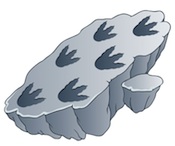
My next step will be even more adventurous: facilitating Walking Classroom courses online. I am confident in my knowledge of the content, but words like forum, Moodle, and wiki are still part of a strange and foreign language for me. Perhaps it’s okay to accelerate a little, though. The road seems pretty safe (even without salt). It may be time to leave my dinosaur footpath and merge into the eight-lane traffic.






























